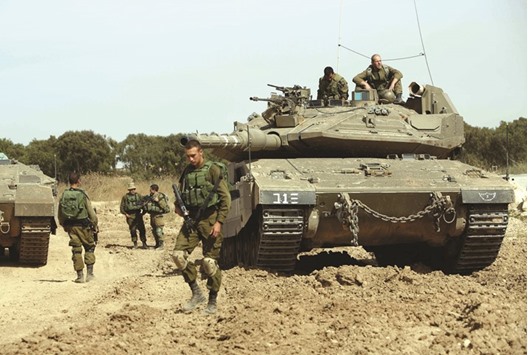Israel launched air raids yesterday on the Gaza Strip after a day of tensions along the border of the Palestinian territory whose Islamist rulers warned against an escalation.
Air strikes hit around Gaza’s derelict international airport near the southern city of Rafah and in nearby farming areas, said the territory’s Hamas-run interior ministry.
Security sources in Gaza said the jets fired two missiles at the airport but said no one was hurt in the strikes.
Israel’s army said its warplanes had hit five sites operated by Hamas.
“The (Israel armed forces) will continue to operate in order to protect the civilians of Israel from all Hamas terrorist threats above & beneath ground,” spokesman Peter Lerner said on Twitter.
The raids followed a bout of violence on the Gaza-Israel border yesterday, with exchanges of fire that put a 2014 ceasefire agreement to the test.
Israeli tanks shelled the Palestinian enclave at least twice, saying it was in response to mortar fire across the border, while the army designated an Israeli border town a closed military zone.
A military official said up to five mortar shells in total were fired at Israeli territory, while forces were fired upon near the small border community of Nahal Oz.
“In accordance with security assessments, a closed military zone has been established in the area of Nahal Oz,” an army statement said.
“It means that only the residents of Nahal Oz and the area can enter.”
Earlier the Israeli army twice confirmed its tanks had fired on targets in Gaza, saying both times it was in response to mortar rounds fired from inside the strip.
Palestinian security sources reported tank fire in Al-Tufah in eastern Gaza.
There were no reported casualties and no claims of responsibility for the mortar fire.
Hamas and Islamic Jihad released separate statements warning Israel against any escalation along the border.
Hamas’ armed wing, the Ezzedine al-Qassem Brigades, said it was ready to respond to Israel’s strikes.
“We will not permit this aggression to continue and the enemy should not invoke any reason and leave the Strip immediately,” the group said in a statement.
Yesterday’s violence puts pressure on a ceasefire that has held since the last round of hostilities in Gaza ended in summer 2014.
Despite Israeli allegations that Hamas is building new tunnels in Gaza that could reach into Israel, the border region has remained relatively quiet since then.
The tunnels were cited by Israel as a key cause of the 50-day 2014 war in Gaza, which killed 2,251 Palestinians, mostly civilians, and 73 Israelis, including 67 soldiers, according to the UN.
The ceasefire which ended the conflict has been sporadically threatened by rocket fire from Gaza.
The UN’s special coordinator for the Middle East peace process, Nickolay Mladenov, said he was “concerned” at yesterday’s escalation.
“It is critical that peace be maintained to ensure the safety and security of Israelis and Palestinians, alike,” he said in a statement.
During a visit to the Gaza border on Tuesday, Prime Minister Benjamin Netanyahu hailed its calmest period in years, according to comments reported by Israeli media.
“We are nearing the end of close to two years since Operation Protective Edge,” he said, referring to the 2014 conflict.
“These have been the quietest two years we can recall since Hamas came to power.”
Daniel Nisman, founder of the Levantine analysis group, said the Netanyahu visit could have triggered a reaction.
“Maybe for Hamas that lit one fuse too many,” he said.
Hamas accuses Fatah of organising military cell
Hamas accused its rival Fatah yesterday of organising a military cell to “breach security and stability” in the Gaza Strip.
In the latest sign of tensions between the Palestinian factions, Iyad al-Bozum, the interior ministry spokesman in the Hamas-run strip, accused senior Fatah leaders of “being behind the cell and communicating with it,” without naming those allegedly involved.
Hamas has ruled Gaza since 2007, while Palestinian President Mahmoud Abbas’s Fatah movement controls the occupied West Bank.
Bozum said the cell was made up of “fewer than 10 people who were arrested around a month ago.”
He said they aimed to “affect the internal situation in the Gaza Strip and internal relations,” including through “incitement,” but would not provide further details.
Fayez Abu Aita, spokesman for Fatah in Gaza, denied the accusations and said the charges would “complicate the internal situation and hinder reconciliation efforts.”

Israeli soldiers stand guard with their tank along the border between Israel and the Gaza Strip near the southern Israeli Kibbutz of Nahal Oz yesterday.
